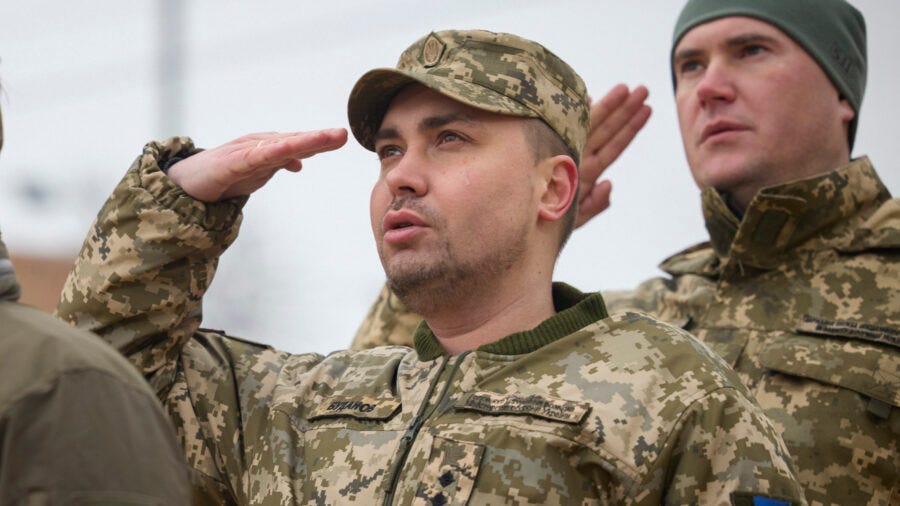
Discover more from Weapons and Strategy
Rumors Ukrainian General Zaluzhny Will Soon be Fired --Replaced by GRU's Budanov
Ukraine is at the tipping point
Rumors are making the rounds in Kiev that Ukrainian President Volodymyr Zelensky will fire the head of the Ukrainian armed forces, General Valerii Zaluzhny. Zelensky and Zaluzhny have been at odds for some time. The excuse is likely to be losses in and around Avdeevka, which is a Ukrainian military stronghold, just north of Donetsk. The rumor says that Kyrylo Budanov, head of military intelligence, will replace Zaluzhny.

Field reports show that the Russians have advanced in the southern part of the town, knocking out numerous trenches and fortifications, with the Russian operation gaining momentum and strength as new troops are poured into the fight.
There is little doubt that Russia will be successful. While the Ukrainian army may be able to delay the Russians, it lacks any ability to stop them cold. If Ukraine tries to bring in extra forces to bolster their chances, they open themselves up to Russian threats elsewhere along the line of contact.
Avdeevka, no matter its importance, is just an excuse for Zelensky. He needs loyal people around him as his situation becomes more precarious. His European and American allies, who still say they want to give him what he wants in arms and financial aid, understand that Ukraine can't stand up to Russian military pressure.
That is why Europe is now in a panic and Washington is searching for a new policy.
Europe believes that if Russia wins in Ukraine, as now seems likely, then Europe is threatened by Russia and Europeans are not prepared. NATO's chiefs, and politicians in Germany, Sweden, Holland,Estonia, Poland and elsewhere are clamoring for strengthening NATO's defenses. The nearly five-month long NATO exercise, starting in late January, is an effort to demonstrate to Russia that NATO will stand and fight. But the exercise may also show the Russians just what they need to do if a conflict does come.
NATO's alleged 90,000 soldier exercise has been given the lofty name, Steadfast Defender. It is supposed to reinforce the notion of NATO reliability. The Russians, meanwhile, have cancelled their big military exercise, called Zapad (West), a message understood by Europe. Russia says it must focus on training its new soldiers, sailors and airmen.
Europe has little to fall back on, as Europe's security is acutely dependent on the United States. Since the collapse of the Soviet Union, perhaps well before, the Europeans have focused on social spending and have invested little in defense programs. Worse still, many of them have taken their strategic reserve war material and sent it to Ukraine, leaving them with empty shelves and warehouses. In Germany, which was supposed to rebuild its armed forces under the slogan Zeitenwende (Turning Point), the German government has been raiding the $108 billion dollar fund to give money and arms to Ukraine.
While Russia appears to have ordered its defense manufacturing companies to work additional shifts to produce armaments, little has been done in Europe or the United States to really move forward production. Instead there are labor shortages, supply chain issues, and slow procurement orders. Meanwhile the US has unloaded most of its critical war fighting supplies, sent to Ukraine, leaving great uncertainty if America could rescue Europe, even if it wanted to do so.
Putting aside the credibility, or lack thereof, of any imminent Russian threat to Europe, the US is changing its policy and is recognizing that it cannot win a conventional war against Russia. (Which also means that it can't win a conventional war against China, maybe not even Iran or the miniscule Houthis.) All of this is clearly visible in Iraq where US bases and installations are regularly bombed by Iranian militias, following orders from Tehran. Their goal is for US troops to leave Iraq and Syria and, accomplishing that, demonstrate that the US is unreliable and unfit to depend upon.
The new Ukraine policy has been emerging over recent months. If understood correctly, the policy is designed to deal with the new reality that Ukraine will lose the war, and Ukraine's government may need to evacuate Kiev. Putting Budanov in effective control of the new policy, and the relocation of Ukraine's capital, probably to Lviv, is the bedrock of the policy. Operationally the policy will be to use special operations, assassinations, bombings and any other means, including blowing up a nuclear reactor, to punish the Russians and keep them off balance. Zelensky is already setting the stage saying Russia will blow up a nuclear reactor. The Russians are no doubt keenly aware that the target will be a reactor in western Russia and it will be Ukrainian saboteurs who undertake the mission.
For Washington there are three imperatives. The first is to be able to keep the war going, and to keep demanding money from Congress. This is a hard act because if Ukraine is collapsing it will be hard to get buy-in for a losing proposition. The reality is likely to be that the Biden administration does not expect that Congress will fork over more billions, especially if it is all but certain to go down a rat hole. What they want to do is blame Congress and Republicans for the loss of Ukraine.
The second imperative is to keep a pro-western Ukrainian government functioning, even if it has to abandon Kiev. It also means that the current government has to politically survive: if a coup d'etat happens all bets are off. So Washington needs to prevent a political breakdown. This is a tall order because Ukrainians are understandably unhappy, in fact miserable, as young and old men are forced to fight a losing war, and many of them don't come home.
The third imperative is to keep Russia out of Europe, meaning to keep European countries from cutting their own deals with Moscow. As Kiev goes, so goes Europe and NATO. If the Russians are able to put a pro-Russian government in Kiev, the Europeans will need to find a practical solution to living with Moscow. The key actor is Germany and the current German government won't talk to Russia, at least not now. But that may change in the near future. If Ukraine falls, Germany will need to change its policy. The easiest way for its government to change direction is to blame the United States for something, such as the Nord Stream pipeline's destruction. That would open the door to a conversation with Putin.












The Biden National Security Team (such as it is) is ignorant, incompetent and reckless.
Putin/Lavrov provided a starting point for negotiations on the 'Ukraine Issue' in December 2021. The Biden people slammed the door on that proposal, fully aware that doing so would probably result in a kinetic response from the Russians. Two years later hundreds of thousands of Ukrainians and Russians are dead, and Ukraine lies in ruins.
I was re-reading a speech that J. William Fulbright gave on the floor of the Senate in December 1967. The subject was (of course) Vietnam. Senator Fulbright said the following:
"People, it will be said, should be rational and should act on their interests, not their emotions...."
Victoria Nuland has a pathological hatred of Russia, Russians and Putin. She is in a rage possibly/probably as a result of how her ancestors were treated in the old country (which does have more than some basis in fact). She is the Biden Administration's prime policy maker insofar as Eastern Europe is concerned; her fingerprints are all over this. Punishing Russia may satisfy some deep emotional urge for Ms. Nuland, but was going down this road in the interests of the United States? The answer is obvious at this point. People with her type of emotional baggage should not be involved in making policy.
What an utter waste!
Not as broken as Russia’s North Western flank. 🇫🇮🇸🇪
With its prisons now empty, its economy in ruins and its stocks of ancient Soviet crap being depleted to nothing, the bear is DESPERATE. And the uptick in vatnick propaganda is the tell.